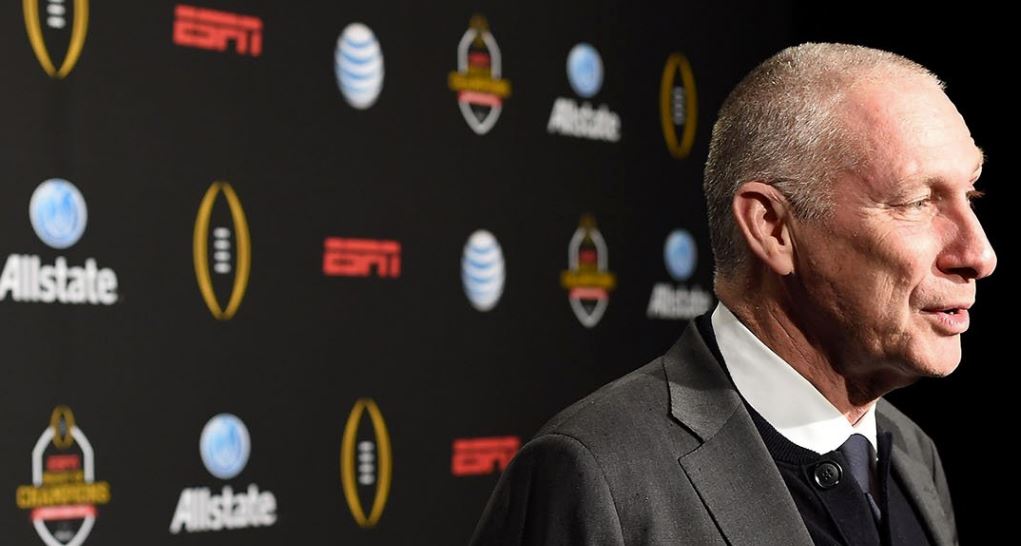


John Skipper Details His ESPN Exit and a Cocaine Extortion Plot
John Skipper, the former network chief, goes public in an interview with The Hollywood Reporter about the real reason behind his abrupt departure from Disney after 27 years, a confession to Bob Iger and his hope to work in sports media again.
As we always tell our clients: Tell the truth, tell it all and tell it first.
We’re not sure Skipper quite hit that mark, but he came pretty darn close.
From writer James Andrew Miller, one of the most honest interviews we’ve ever read:
On Dec. 18, 2017, John Skipper suddenly resigned as president of ESPN and co-chairman of Disney Media Networks, citing his desire to seek treatment for what he called a “substance addiction.” The announcement shocked employees at ESPN and its parent company, and was met with disbelief and confusion throughout the sports and media worlds.
Skipper, 62, the married father of two sons, was raised in North Carolina and had worked at Disney for 27 years. He became president of ESPN in January of 2012 and spearheaded the company’s aggressive campaign to secure long-term rights deals for live sporting events from the NBA, college football and many other sports. But cord-cutting, rising programming costs and other challenges during Skipper’s presidency resulted in several rounds of layoffs and skepticism from Wall Street about ESPN’s future. Prior to his departure, Skipper had been orchestrating a multipronged strategy to combat the negativity and project an optimistic and ambitious trajectory for the company in the years ahead.
Over the course of several hours during the first two weeks of March, Skipper was interviewed for the first time since his departure by ESPN historian, journalist and Hollywood Reporter contributor James Andrew Miller. The following is excerpted from those in-person conversations:
JAM: How are you?
Skipper: I’m doing well.
JAM: In your resignation statement, you wrote, “I have struggled for many years with a substance addiction. I have decided that the most important thing I can do right now is to take care of my problem.” Do you feel like you’ve done that, or at least begun the process?
Skipper: I did get some therapy. I did go through treatment. I thought the best thing to do was to take the time to check myself into a facility, and I was able to understand a bit more about substance use and to think about how it intersected with my life. Therapy isn’t easy, particularly for a Southerner tightly wound with traditional values. I have not necessarily been comfortable reflecting and being self-reflective.
I’ve grown to learn that taking care of yourself is a continuous, lifelong process. What I’ve done is taken some time for reflection. I’ve had an opportunity to not use for a long period of time, and I have resources to help me now, which are ongoing.
JAM: Let’s talk about the nature of the substance abuse, please.
Skipper: The statement I released was accurate. I had a substance abuse problem. I grew up wanting to be countercultural. I worked at Rolling Stone for the first 10 years of my professional life. I had a point of view that recreational drugs were recreational, that they weren’t dangerous. That they could be used without repercussions.
JAM: So, we aren’t talking about alcohol.
Skipper: No, I’ve been a social drinker my whole life. I enjoy a martini, I enjoy a bottle of wine with friends for dinner. I’ve never had an issue with alcohol. You know, I’m an old hippie, and then an old New Yorker from the ’80s.
JAM: Am I safe to assume then that your substance addiction was cocaine?
Skipper: It’d be safe to assume that.
JAM: Any heroin?
Skipper: Never.
JAM: Opioids?
Skipper: I don’t use opioids. I have never put a needle in my arm. I’m not interested in fentanyl.
JAM: Did your cocaine use ever get in the way of your work?
Skipper: Never. At ESPN I did not use at work, nor with anyone at work, or with anyone I did business with. I never allowed it to interfere with my work, other than a missed plane and a few canceled morning appointments. I’ve never been a daily user. My use over the past two decades has, in fact, been quite infrequent. I judge that I did a very good job and that it did not get in the way of my work. I worked hard, I worked smart. I worked all the time.
JAM: You were, however, dealing with an illegal substance. Throughout your years of use, were you worried about getting caught?
Skipper: It turns out I was more than unusually clever in devising ways to separate my professional life from my personal life.
JAM: Clever as in one wouldn’t have seen the president of ESPN walking around Central Park at night in search of coke?
Skipper: Not at all. Let’s just say I was careful.
JAM: Did you resign as president of ESPN?
Skipper: Yes.
JAM: Were you asked to resign by Disney CEO Bob Iger?
Skipper: It was clear to me that I put Bob in an untenable position.
To read the rest, click here.